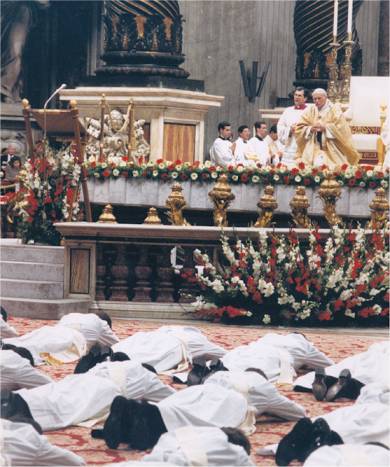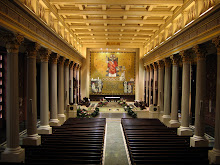Often in the structure of the Church’s cycle of Liturgical Readings, the selection of the First Reading is geared towards an understanding of the Gospel reading, so that we are able to better understand the mystery of Christ by seeing how He was foreshadowed in the Old Testament. Therefore, a few weeks ago when we had the story of Jesus curing the Leper, it was informed and explained by the selection from Leviticus that dealt with how Lepers were to be treated in the Jewish community.
Today, however, there seems to be a greater connection between the First Reading and the Second Reading, and well the Gospel sort of hangs out there by itself. (I’m stretching a little bit here, but stay with me.)
In our first reading, we hear of the response of God to Noah upon the landing of the Ark. As the great ship lands, the first thing that Noah does is to offer a sacrifice of praise before God. He takes the finest of the clean animals and gives them to God to say ‘thanks’ for bringing him and his family safely through the flood. God then repeats the instruction that he gave to Adam to ‘fill the Earth and subdue it,’ but then extends his promise to Noah in an even greater way with the words that we have here: “I am establishing my covenant with you and your descendants; and through you to every living creature that was with you on the Ark.”
How is it that Noah is so privileged to be bestowed such a great promise? To see that, we have to turn back even further in Genesis, prior to the Flood. He was found worthy because he trusted in God and followed His commands, even though it cost him ridicule, even though it cost him a lack of respect, even though he was shunned from the community; after all, they would all be destroyed in the flood while God would protect Noah and his family. When Noah heard the invitation to build the Ark, he responded in faith and action, and then becomes a model for what will happen in Christian Baptism, as the waters of the Great Flood washed the sins off the face of the Earth, the waters of Baptism wash the sins from the one who is to be baptized.
But as we come to the First Letter of Peter that we heard today, the image of how God works with His people is fleshed out even more. We continue to call to mind the story of the flood, how even after the Ark was built by Noah, God waited seven days before He sent the waters of the flood on the Earth. This is a very important detail then to St. Peter in his letter, for it shows that when one of the faithful responds to God’s invitation, God allows that person to be an example and invitation to others, a witness, an evangelist, so to speak, to draw others into conversion and contrition. God waited after the Ark was built to give them the chance to repent and then also board the ship so that they too might be saved, yet they rejected that.
Noah’s example of being persecuted, Noah’s example of suffering, was in itself and invitation to his brothers and sisters at the time to accept God’s invitation, and they refuse.
This, then, is the idea that St. Peter picks up and develops in his letter, a letter written at a time where severe persecutions had not yet broken out, but was starting to develop. At the time, slaves who had become Christians were being maltreated. Sons and daughters who came into the Faith were being excluded from wills and family structures; the culture was becoming more and more hostile to the faith; and Peter writes to encourage his fellow Christians to fight the good fight, to keep true to the faith, so that those who suffer for doing what is right may have a clear conscience and follow God reservedly.
This then, is the important lesson that we have for today, as well. We find ourselves in a culture very much like what the early Church found itself in. Our world no longer understands who we are and what we do, and when one is faithful to the teachings of Christ found in the Church, that person is often reviled and put to shame in the eyes of this world. When a Catholic family rejoices in the birth of even their fourth or fifth child, much less eighth or ninth, the response is often: “There’s a pill for that, you know.” When someone takes the time to pray during the day, their boss might challenge them to ‘get back to work and stop wasting time.’ When someone refuses to join the sports program on a Sunday morning because they feel a necessity to come to Mass, the child is cut from the team.
Let us resolve during this season of Lent to willingly boast of these revilements, to suffer in patience as did Noah and Job before us, so that we might be living invitations to our brothers and sisters to come to know Christ in a deeper and more profound way. So that we might have a clear conscience in following Christ, and by the joy that comes from being a committed and intentional disciple of Christ, might win others for the sake of the Kingdom.










2 comments:
do you play golf? or tennis?
you should ...
you seem to have good follow-through
sadly, I am pathetic at both golf and tennis, thanks for the compliment, tho!
Post a Comment